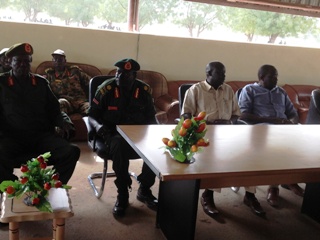SPLA says it respects security deal, but will retaliate if attacked
By Bonifacio Taban Kuich
March 14, 2013 (BENTIU) – The South Sudanese army (SPLA) will respect the recent security agreement reached with Sudan, but will protect and defend its territorial integrity if attacked, the army’s fourth division commander said Thursday.

Both Sudan and South Sudan last week agreed on immediate and unconditional withdrawal of forces to their respective side of the border within two weeks, to allow for the establishment of a Safe Demilitarised Border Zone (SDBZ).
As part of the security agreement, the two countries also committed themselves to the deployment of the Joint Border Verification and Monitoring Mechanism (JBVMM) and the activation of all security related mechanisms, starting 10 March.
Under the agreement, both countries are required to deploy their troops 10 kilometres from their current positions to their side of the border, with the United Nations Interim Security Forces for Abyei (UNISFA) tasked with monitoring the area.
The inclusion of the so called ‘Mile 14’ in the proposed border buffer zone last year caused anxiety in South Sudan’s Northern Bahr el Ghazal state, despite the African Union (AU) and the UN making clear that the location of the buffer zone would have no bearing on any final border settlement.
Sudan had initially proposed an extension of the demilitarised area on the common border to include Blue Nile and South Kordofan states, but Juba declined to accept. The Sudanese army (SAF) later claimed Juba refused to withdraw its troops from the disputed area until the two reached a consensus on the mediation process, which is being overseen by the AU High Level High Level Implementation Panel (AUHIP).
Speaking at the opening of the headquarters, Chuol urged both the national and state governments to strengthen collaborative efforts to eradicate cattle raids, which continue to cause insecurity among neighbouring states.
Unity state’s deputy governor, Michael Chiengjiek Geay, insists the newly reached security agreement will improve strained relations between South Sudan and its northern neighbour.
At the same time, he encouraged the army to step up the fight against rampant cattle raids, saying civilians continued to hold illegal arms, despite the government’s various disarmament campaigns.
He said the army should take a hard line on cattle raiding activities, once the cattle rustling law is amended.
“I know every one of us has relatives [involved] in all sorts of cattle practice[s] in South Sudan, but brother and sisters, I want to assure you that if the government comes out with a law that [stipulates] whoever [is] involved in cattle raiding must be killed, you should not react negatively to it”, the deputy governor said.
He urged the army to remain vigilant on cattle raiding activities, saying the practice is threatening to undermine the struggle for South Sudan’s independence, attained after over two decades of civil with Sudan.
South Sudan has been plagued by cattle raids and ethnic violence since gaining independence in July 2011. The UN estimates some 200,000 South Sudanese are likely to be internally displaced this year because of ongoing violence.
(ST)
